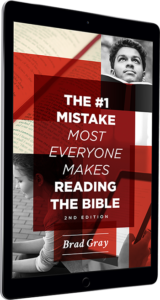Episode 099 – Parable of the Lost Son Pt 6: Shame on the Cross
Key Passage(s): Luke 15:11-32
Honor and shame played a significant role in the cultural context of Jesus’s life and ministry and those themes find their way into his parables as well. Like a stain, shame diminished a person’s worth in the eyes of the community, and shame continues to have this crippling effect on countless people. From start to finish, this parable is saturated with shame, and Jesus seems to have designed it this way on purpose. Why? Because Jesus is telling us something about Himself and what happens to shame on the cross.
Discussion Questions
- What was your biggest takeaway from the final Lost Son (prodigal) parable teaching?
- What have been some of your own experiences with shame?
- By scorning the shame of the cross, Jesus, in essence, also scorns the shame that marks our lives. What do you think it looks like to allow Jesus to speak to, touch, and bless the tender places of shame in your life?
- It was said in the teaching, “There is no length God won’t go to remind you that you are loved, accepted, pursued, cherished, and celebrated.” Do you believe this is true? If you’re struggling to believe this, why do you think that is? What may God be saying to you?
- How will you begin living out the truths of this teaching this week?
For Further Study
- How to Read the Bible: The Parables of Jesus by BibleProject
- Stories With Intent by Klyne Snodgrass – Pages 117-143
- Poet & Peasant and Through Peasant Eyes (Combined Ed.) by Kenneth Bailey – Pages 158-206 in Poet & Peasant
- Jesus, The Middle Eastern Storyteller by Gary M. Burge – Chapter 6
- The Parables by Brad Young – Chapter 7
- The Return of the Prodigal Son by Henri Nouwen
As an Amazon Associate, we earn from qualifying purchases (at no extra charge to you).





Thanks for another great teaching. What an amazing picture of who God is.
Indeed, Susan. Thanks for sharing!
AWESOME!!! Simply AWESOME!!!
Grateful you found the teaching helpful, Wesley!
Thankful for your insight into this parable. Always wondered about that “pompous” second son and could never figure out why he acted that way toward his father and brother. Wonderful that Jesus was depicting Himself as the Father, the older son as the Pharisees, and younger Son as seekers of Himself. Comforting!
Glad to hear this teaching was helpful to you, Sandy!
The thrust of the teaching, as i understand, and greatly appreciate, is the Father removes the shame of the younger, and older son in the eyes of the community, for both of their offenses.
The parallel is that Jesus/God is the father and in God’s community/spiritual realm, perhaps seen as the heavenly council(per the bible project videos), we are in rebellion, in shame, and Christ removes our shame/rebellion and restores us to the family and in the spiritual community.
Which is awesome, and incredibly humbling.
My question is about the place of shame in the parable. Shame is what the father, as a established member of the community, can protect and remove from his son. As the wronged party, he has the right to set the tone the rest of the community is to take in this specific case.
This directly parallels God’s ability to forgive Sins, as he is the wronged party, but the shame device here can be seen on multiple levels, as shame is a derivative of the sin act, either communally or personally.
you could say that the shame the father removes is merely the device and representative of Christ’s forgiveness, but you can’t because shame is a derivative of sinful action. However, God is often not recognized in our society or accurately represented, as such, he doesn’t hold the societal power to remove shame a society would through on us.
The Hound of heaven will pursue us in love to the end of the earth. He will gently wrestle with us and inflict injury only as a last resort method to get us to change our destructive ways.
There are two hard parts to this, first is accepting the gift and giving up the shame we(I at least) have placed on myself. Second, is living in Gods community, which is at odds with the world we live in and outside of the Christians we live with, is not visible per se, which conversely means disregarding the community of the world. living among them, but not in them.
I do not understand the process of how to do these two hard things. i see the input, i see the output, but the process we(I) take to transition between the two is the mystery i see.
Could you provide some light on this, if possible. Thanks for your time.
Hey Jordan, I just put together an audio response and my assistant will be emailing it to you. Thanks!
Culture in nations you mentioned still extant but in America we have locked into:
Everyone doing that which is right in their own eyes with no community demands period-thus we seek lawlessness a violation of the Laws of God!
So the purpose of Jesus ministry was to focus us on and to His father not himself which the church as done-Jesus is more sung/talked/ about about than the OT God-His father?
Evidence: hymns done away with in our churches and if sung sung so badly that old believers still cannot sing with it!
Hey Bill, Jesus was drawing us back to the Father because as he says multiple times in John, “I and the Father are one.” From a trinitarian perspective, God is Father, Son, and Holy Spirit, and they’re working together in the purest way possible. The God of the Old Testament and the God of the New Testament are obviously the same, and Jesus is this God in human form. Astounding!
Great series, thank you.
You alluded to your studies under “a great rabbi,” you’re such a tease. Does the great rabbi have any books? I am so interested in learning from him too. Thanks again.
His work is all in Hebrew 🙂 But a great rabbi I love reading and listen to is Rabbi Jonathan Sacks. Check out his work at rabbisacks.org.
Thank you, I’ve had some Hebrew in Seminary, but more than likely would be a great struggle.
You are welcome, Gary.